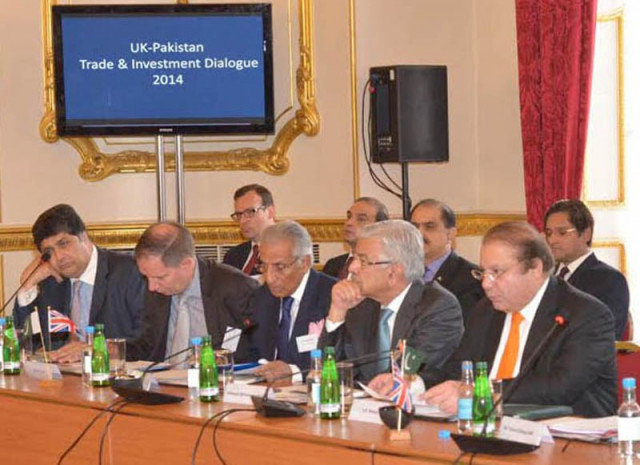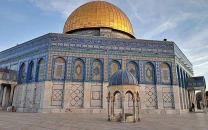Energy development key to sustainability and good relations: PM Nawaz
Military operation in North Waziristan should be followed by a political dialogue, says British foreign secretary

Energy development key to sustainability and good relations: PM Nawaz
Addressing the Pakistan-Britain Energy Dialogue and Investment Conference in London, the premier said, "The primary discussion of today is for the formulation of an optimal energy sector in Pakistan, and to develop a competitive energy industry."
“If the energy crisis is resolved it will benefit politicians along with citizens,” the premier said while talking to Express News.
The premier thanked the UK government for organising the conference and guidance in achieving important energy sufficiency goals for Pakistan.
"The UK government over the years has been supportive of Pakistan in all its endeavors," said Nawaz, adding that he was confident of the agreements and the direction in which he is taking the energy sector of the country.
He said Pakistan also aims at development one of the largest coal deposits in the world at Thar as future energy capital of the country. The vast reserves of Thar are enough to meet energy needs of many countries of the regions for tens of decades to come. The government is committed to provide complete support for successful and early exploration of these reserves.
“My vision is to develop a competitive energy market in Pakistan. With this in view, I have tasked my team to attract investment from all over the world in generation, exploration, distribution and transmission of both power and gas sectors. We are prepared to transfer management control for improving service delivery, while retaining majority shares in these companies. I fully realize that this turnaround will require our complete commitment and support,” the premier said.
Nawaz also took time to explain how recent agreements signed with China would not only lead to development in both countries, but also enhance relations between the neighbouring countries.
He further spoke of projects such, as the Turkmenistan, Afghanistan, Pakistan and India (TAPI) pipeline -- which would also increases regional cooperation.
"Energy and communication infrastructure form the backbone of progress in a society," Nawaz said.
Challenges after taking office
"We inherited a challenging macroeconomic situation when we took office," he said, adding that there needed to be improvements in the revenues, fiscal deficit, abd development portfolio -- all of which the premier claimed to have increased or improved.
"We reduced the budget deficit, increased GDP growth. Further, our stock market has been one of the best performing stock markets in the world."
Nawaz said the government continues to be confronted with massive energy shortages, to which he said the solution would "require a fundamental change in policy and governance."
Responding to a question regarding the ongoing Pakistan Tehreek-e-Insaf sit-in, Nawaz while talking to Express News said, “They should know that their attempts to destroy Pakistan have failed and should work with us for the betterment of the country.”
“The protests were not to derail our government but to derail Pakistan,” the premier continued.
“They [protesters] should think positively and not negatively because if we are successful in our projects, the governments to come will benefit.”
Peace in the region linked with energy security
Appreciating the initiatives taken by Pakistan to work with its neighbours for regional peace and stability, British Foreign Secretary Philip said peace in the region is linked with energy security and hoped for enhanced economic collaboration between regional countries.
He called on Prime Minister Nawaz Sharif on the sidelines of Pakistan-UK Energy Conference in London. During the meeting the two sides discussed a wide range of issues of mutual interest particularly energy crisis in Pakistan and security situation in the region.

Hammond said the British government is of the view that the military operation in North Waziristan should be followed by a political dialogue for long lasting peace and stability.
Sharing his government’s reform agenda with the British foreign secretary, the premier said during last 17 months, Pakistan’s economy had shown improvement, with GDP growth rate reaching 4.1 per cent.
Nawaz also highlighted the government’s energy strategy to produce cheap electricity by improving fuel mix and actively implementing its plan to reduce line losses and power theft.
Highlighting the success of military operation Zarb-e-Azb, the prime minister said in order to prevent regrouping of terrorists in Afghanistan, the government was in contact with Afghan President Ashraf Ghani and both countries were working together to promote peace and stability in the region.
Special Assistant to the Prime Minister Syed Tariq Fatemi and Pakistan High Commissioner to the UK Syed Ibne Abbas were also present at the meeting.



















COMMENTS
Comments are moderated and generally will be posted if they are on-topic and not abusive.
For more information, please see our Comments FAQ